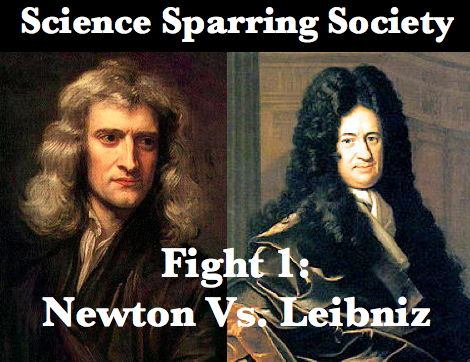The first fight to be featured in the Science Sparring Society is between the two biggest intellectual heavyweights of the late 17th Century, Isaac Newton and Gottfried Leibniz. Their battle over the Calculus was so epic they call it a war!
Music from:
liverpoolguitarsociety
Djlo(2)(3)
CameronMusic
folkcello
[wpaudio url=”http://media.blubrry.com/scc/acmescience.com/Podcasts/SSS/sss1nvl.mp3″ text=”Fight 1: Newton Vs. Leibniz” dl=”0″]
Do not forget to subscribe via iTunes, and leave Science Sparring Society a review in the store.
Also, you can follow @acmescience on twitter for all your Science Sparing Society updates.

Next fight should be Tesla vs Edison!
It is definitely on the list of upcoming fights.
Will write you a list of some of the mains errors later. 😉
Some of the main historical errors and misrepresentations in your pod cast. I apologise for the somewhat abrupt style but as you can see it’s way too long as it is 😉
1) There is nothing strange about Isaac being sent away to school, Woolsthorpe being a very small agricultural village doesn’t have a grammar school!
2) Newton was very happy lodging with the apothecary in Grantham, a perfectly normal arrangement, from whom he also received help in furthering his studies.
3) Newton’s superior intelligence was very much recognised in his school time and he was even given a special departure ceremony with speech praising his achievements when he left to go to Cambridge.
4) That his mother took him out of school to manage the farm was also perfectly natural as he was destined to inherit the farm, which generated an income of £600 per annum at least six time more than he would get paid as a professor in Cambridge.
5) I’ve said it before and I’ll probably say it a thousand times more before I die, Cambridge was not a top university in the last third of the seventeenth century. It was an educational backwater with a bad reputation. Also the Lucasian Chair of Mathematics carried with it no status at all. (See my post from 25.12.2011)
6) The attempt to contrast the superior successful Newton with a downtrodden unsuccessful Leibniz is historical bullshit. When the calculus wars took place, about which more soon, Leibniz like Newton was recognised as one of the intellectual giants of Europe. In turns of academic status it was a clash of equals.
7) The calculus wars did not start with Leibniz’ first publications. In fact Newton acknowledged Leibniz’ achievements whilst claiming priority for himself. At that time both saw it as a case of simultaneous independent invention.
8) Even in the 1690s when the Swiss mathematician Nicolaus Fatio de Duillier, who knew and had worked with both Newton and Leibniz, first accused Leibniz of plagiarism Newton apologised and exonerated Leibniz.
9) The accusations of John Keill in 1707 were the beginning not climax of the calculus war. The situation was certainly also exacerbated by the philosophical dispute between Newton and Leibniz about the theory of gravity.
10) It was actually Leibniz who requested that the Royal Society should officially investigate the accusations that Keill had made against him. An unwise move as you correctly point out given that Newton was president of that august body. Leibniz assumed that Newton, who had never personally attacked him and had on more than one occasion acknowledged his independent invention of the calculus, was an honourable man. He was mistaken. Not only did Newton stack the committee in his own favour he actual wrote the committee’s report himself. Of course finding Leibniz guilty as charged. He even took the dispute beyond the grave publishing a new account of a collection of documents that supposedly proved his case several years after Leibniz’ death.
11) That Georg of Hannover did not take Leibniz with him when he became King of England in 1714 probably had as much to do with the dispute over the theory of gravity as that over the calculus.
12) Your assessment of the troops mustered on both sides of the dispute is also somewhat inaccurate. Whilst it is true that Jacob and Johann Bernoulli were superior to any of the Newtonians with the exception of Isaac himself there were top class mathematicians and mathematical physicists on the English side too. David Gregory, Abraham de Moivre, Brook Taylor and Colin MacLaurin were all members of the Newton camp.
13) You are perfectly correct in stating that English mathematics fell behind the continental developments during the eighteenth century however George Green paper from 1828 was by no means the first mathematical publication in the continental style in England in the nineteenth century.
14) Robert Woodhouse a highly influential Cambridge tutor published his textbook on the continental style of analysis Principles of Analytical Calculations in 1803.
15) Charles Babbage and John Herschel published their first volume of The Memoirs of the Analytical Society in 1812 and the second volume in 1817. (See my blog post from 26.12.2011)
16) By the time George Green became a mature student in Cambridge in 1832 Woodhouse, George Peacock and William Whewell had already introduced the continental methods into the Cambridge mathematical syllabus.